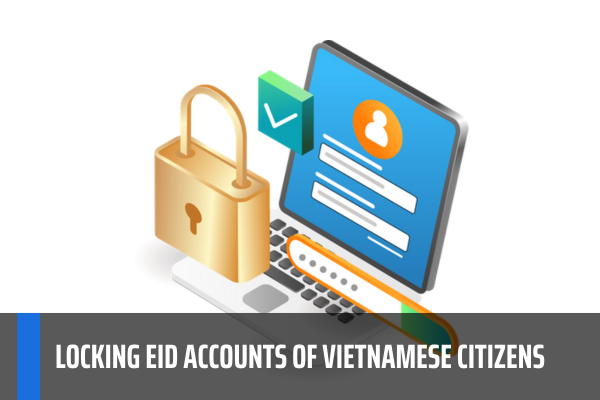What are the cases of locking eID accounts of Vietnamese citizens? Who has the authority to lock eID accounts?
What are the cases of locking eID accounts of Vietnamese citizens?
Pursuant to the provisions of Clause 1, Article 19 of Decree 59/2022/ND-CP regulating the locking eID accounts of Vietnamese citizens as follows:
Locking and unlocking eID accounts
1. Locking Vietnamese citizen's eID accounts
a) The electronic identification and authentication system automatically remembers and locks an eID account if the eID holder makes the request for locking his/her account; the eID holder is in breach of terms of use of the VNeID app; the eID holder's ID card is revoked; the eID holder dies. The system can remember through the eID holder’s declaration made on the VNelD app or input of updated eID information into the electronic identification and authentication according to Article 10 herein.
b) If a procedure-conducting agency, competent regulatory authority or service user requests an eID account to be locked, the account locking request must be sent to the Police to seek their approval for such request.
c) Within 02 working days, the request-receiving Police’s head can approve the locking request in the case specified in point b of clause 1 of this Article, and notify this to the agency or entity making the account locking request and the eID holder. In case of rejection, a written reply with clear reasons for such rejection must be sent.
...
Thus, based on the above regulations, cases of locking eID accounts of Vietnamese citizens are as follows:
- The eID holder makes the request for locking his/her account;
- The eID holder is in breach of terms of use of the VNeID app;
- The eID holder's ID card is revoked;
- The eID holder dies.
The recording is done through the electronic identity subject declaring on the VNelD application or updating electronic identity information into the electronic identification and authentication system specified in Article 10 of Decree 59/2022/ND-CP.

What are the cases of locking eID accounts of Vietnamese citizens? Who has the authority to lock eID accounts?
Who has the authority to lock eID accounts of Vietnamese citizens?
Pursuant to the provisions of Article 20 of Decree 59/2022/ND-CP stipulates as follows:
Authority to grant eID accounts and issue decisions to lock or unlock eID accounts
1. Director of the Police Department on Administrative Management of Social Order under the Ministry of Public Security shall be mandated to issue eID accounts; issue decisions on automatic locking or unlocking of eID accounts on the electronic identification and authentication system, and requests for locking or unlocking of eID accounts of central department-, equivalent- or higher-level agencies.
2. Directors of Police Sub-Departments on Administrative Management of Social Order under Police Departments of provinces and centrally-affiliated cities shall be mandated to issue decisions on eID account locking or unlocking requests filed to these Police Departments.
3. Directors of Police Divisions of districts shall be mandated to issue decisions on eID account locking or unlocking requests that the Divisions receive.
4. Directors of Police Sub-Divisions of communes shall be mandated to issue decisions on eID account locking or unlocking requests that the Sub-Divisions receive.
Thus, based on the above regulations, the authority to decide to lock eID accounts includes:
- Director of the Police Department on Administrative Management of Social Order under the Ministry of Public Security shall be mandated to issue eID accounts; issue decisions on automatic locking or unlocking of eID accounts on the electronic identification and authentication system, and requests for locking or unlocking of eID accounts of central department-, equivalent- or higher-level agencies.
- Directors of Police Sub-Departments on Administrative Management of Social Order under Police Departments of provinces and centrally-affiliated cities shall be mandated to issue decisions on eID account locking or unlocking requests filed to these Police Departments.
- Directors of Police Divisions of districts shall be mandated to issue decisions on eID account locking or unlocking requests that the Divisions receive.
- Directors of Police Sub-Divisions of communes shall be mandated to issue decisions on eID account locking or unlocking requests that the Sub-Divisions receive.
How to unlock eID accounts of Vietnamese citizens?
Pursuant to the provisions of Clause 4, Article 19 of Decree 59/2022/ND-CP stipulates as follows:
Locking and unlocking eID accounts
...
4. Unblocking eID accounts
a) The electronic identification and authentication automatically unlocks an eID account immediately when grounds for automatically locking that eID account no longer exist;
b) If a procedure-conducting agency, competent regulatory authority or service user requests an eID account to be unlocked, the account unlocking request must be sent to the Police to seek their approval for such request.
c) Within 02 working days, the request-receiving Police’s head can approve the unlocking request in the case specified in point b of clause 2 of this Article, and notify this to the agency or entity making the account unlocking request and the eID holder. In case of rejection, a written reply with clear reasons for such rejection must be sent.
...
Accordingly, The electronic identification and authentication automatically unlocks an eID account immediately when grounds for automatically locking that eID account no longer exist.
If a procedure-conducting agency, competent regulatory authority or service user requests an eID account to be unlocked, the account unlocking request must be sent to the Police to seek their approval for such request.
Within 02 working days, the request-receiving Police’s head can approve the unlocking request in the case specified in point b of clause 2 of this Article, and notify this to the agency or entity making the account unlocking request and the eID holder. In case of rejection, a written reply with clear reasons for such rejection must be sent.
LawNet
